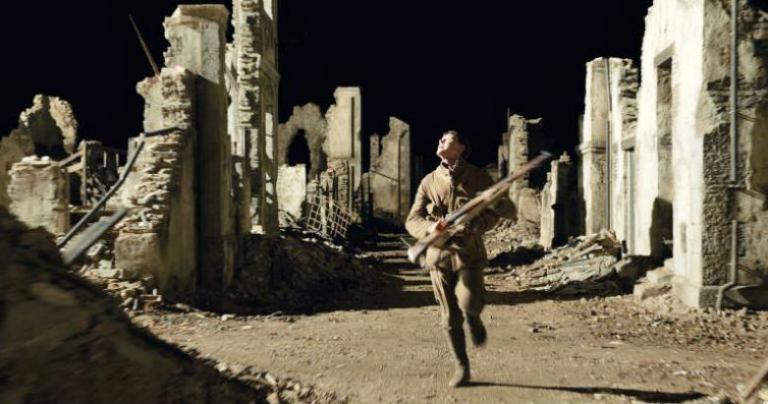
We hear a lot today about “toxic masculinity,” and how everything traditionally associated with men is bad and vastly inferior to what women do. Seeing the new move 1917 reminded me of how ridiculous that is.
The Men of 1917
As I watched director Sam Mendes’ saga of two young British soldiers — Blake and Scofield (George McKay, Dean-Charles Chapman) — on a desperate quest across the killing fields of World War I France, it reminded me of the raw physical courage of men, their deep bonds of friendship and loyalty, and how they have so often sacrificed their hopes, dreams, bodies and even their lives in service of those — especially the women — back home.
Duty and honor are old-fashioned concepts, but they’re ones the best soldiers understand. These two young men are just pawns in the Great War. One is an officer and one is not, so probably one volunteered and the other was conscripted (and the conscript gets conscripted again, for the movie’s mission). It wasn’t their decision to go to war, and they’re not privy to the machinations of the great men above them. All they can control is what they do themselves and for their fellow soldiers.
They are brave, resourceful, determined and kind — a kindness that comes at a very high price.
There’s a feeling these days that if you praise men, you’re somehow diminishing women — and the only way to raise women up is to drag men down. But life is not a zero-sum game. Millions of women have suffered throughout history, but also, millions of men have been maimed, psychologically damaged and killed in war and at work, to protect and care for the women and children in their lives.
We are equal in dignity, but we are not the same — and the suffering of both sexes isn’t some kind of a ledger where winners and losers are declared by the numbers.
The Cinematic Conceit of 1917
There is also a gimmick at the heart of 1917 — the illusion that the entire movie takes place in one unbroken shot. Since the action stretches over an afternoon through the next morning, and the film is two hours long, obviously, that’s not the case.
Mendes and cinematographer Roger Deakins have to pull a few visual sleights-of-hand to conceal edits, and the story takes some improbable twists to keep the timeline moving forward (think about how long raw milk actually stays good in a bucket, for instance).
Before I saw the film, I wondered what might be lost along the way to achieving the gimmick. We’ll never know for sure, but as good as this film is, I can’t help but feel that the ultimate equation didn’t quite work in its favor.
There are a few famous faces — Colin Firth, Andrew Scott, Mark Strong and Benedict Cumberbatch — but they’re almost incidental to the story.
The real stars are the leads, two little-known actors who won’t be after this, especially since 1917 won Best Motion Picture, Drama, and Best Director, Motion Picture, at last Sunday’s Golden Globes Awards.
The Faith of 1917
Faith is also woven subtly through the story: in a drunken joke, in a visual, in church bells ringing improbably in a town where there’s hardly a building left standing, let alone a bell tower. And the soundtrack includes a beautiful traditional folk/gospel song called Wayfaring Stranger, performed here by Ed Sheeran.
I sat in a full theater on Monday night for 1917, and I suspect a lot of that was an aftereffect from the Golden Globes. If true, I’m happy that especially young people will see this story. I hope they come away appreciating the humanity and courage of young men 100 years ago, on another continent, finding their way through hell on earth.
I hope they appreciate all the brave men in their lives, and the daily sacrifices they make. Whatever you think of any war in particular, each one is also made up of thousands of individual choices: some cruel, some foolish, some selfish, and some almost impossibly noble.
The Message of 1917
There are many messages in 1917, but one of the biggest ones is that a person can make a difference, if he or she is willing to put everything on the line for someone else.
Produced by Neal Street Productions for DreamWorks Pictures in association with New Republic Pictures, 1917 (official site here) was released in selected cities on Christmas Day, and rolls out nationally on Jan 10.
Image: Universal Pictures
Don’t miss a thing: Subscribe to all that I write at Authory.com/KateOHare














